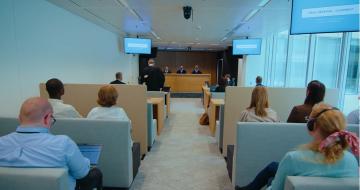Table of Contents
Copyright grants two types of rights to the rights holder:
- economic rights
- and moral rights.
Economic rights
Economic rights allow copyright holders to earn income from the use of their literary or artistic works by others.
Economic rights grant the author the exclusive right to exploit the work.
The main economic rights are: the right to reproduce the work and the right to communicate it to the public.
Right of reproduction
A reproduction of the work, for example a copy, requires the permission of the copyright holders of that work.
This right allows the holders to control the exploitation of their work when copies are made.
All types of copies are covered by the right of reproduction:
- permanent or temporary copies,
- full or partial copies (except in case an exception is applied, for example for citations or reprography),
- copies made to be sold or donated,
- copies made for a third party or for oneself (except for a private copy).
The rights holders’ permission is required to make identical reproductions of a work, regardless of the medium on which the reproduction is made.
Examples:
- a paper copy of an article, but also a scan of the article;
- copying a DVD to a computer's hard drive;
- photographing of a sculpture;
- digitalising this photograph constitutes a second reproduction of the sculpture, as well as a reproduction of the photo;
- the transcription of a speech.
The holders’ permission is also required to copy original elements of a work, even if it is not a faithful copy. Adaptation and translations of works are therefore reproductions that require permission (film adaptation of a book, developing a game based on a film, etc.).
The right of reproduction also applies when only certain elements of a work are copied.
Examples:
- copying a sequence of musical chords or a dialogue excerpt of a film in order to integrate it in a piece of music (“sampling”);
- using a song excerpt in a commercial;
- modifying certain aspects of a video game character and using it on a web page.
Right of communication to the public
The copyright holders’ permission is also required in order to be able to share a work with the public.
This includes:
- live performances such as concerts or plays, any kind of shows, public recitations of texts, etc.;
- communication using technical equipment in a public space, such as radio and TV broadcasting (including satellite broadcasting), broadcasting a work in a place that is accessible to the public, cable transmission, video on demand, putting a work to the disposal of the public via the Internet, etc.
Lending and rental rights
The copyright holders’ permission is required to make copies of a protected work available for rent or to lend them.
Distribution right
The rights holders’ permission is needed to make material copies of their work available to the public, for example in the form of books, discs, CDs, DVDs, etc. The right of distribution also applies to importation.
Permission is required even if copies are distributed free of charge.
However, permission is not required to sell second-hand copies or to give away copies, provided that the copies had been legally distributed on the market. This is called the exhaustion of the right of distribution.
Resale right for visual artists
Only authors of visual or graphical works are entitled to the resale right. These works are mainly paintings, sculptures, collages, drawings, engravings, lithographies etc. The purpose of this specific right is for the author to share in the profits from the successive sales of his visual works, since selling constitutes the main method of exploitation of these works. An unknown artist generally sells his work at a relatively low price. As soon as he becomes more well-known, the value of his work can significantly increase with each resale, but the artist does not benefit from it since he does not have any right on that sale. The resale right remedies this situation.
Every time an original visual or graphic work is sold, a degressive percentage (4% to 0.25% on successive instalments) is levied on the selling price. This is paid out to the artist or creator, provided that the selling price is higher than 2,000 euros and that an art-dealing professional was involved in the sale.
Exceptions to economic rights
There are cases in which the law stipulated, exceptionally, that the copyright holders’ permission is not required in advance: these are the exceptions to copyright.
Moral rights
The purpose of moral rights is to protect the author’s personality which is expressed in the work. It is the expression of the connection between the author's persona and his creation.
Due to its intrinsic connection to the author's persona, moral rights cannot be waived by the author, unlike economic rights.
Moral rights include
- the right of disclosure,
- the right of paternity,
- and the right of integrity.
The right of disclosure
The right of disclosure is the author’s right to decide to release his work to the public. Only the author has the right to decide when he considers his work to be finished and ready for release.
For example, if an author gives the manuscript of a book to his publisher in order to ask for his feedback, the publisher is not allowed to publish the book since this violates the right of disclosure.
Right of paternity
Authors have a right of paternity over their works. This means that the author of a creation is recognised as such and, consequently, any third parties are obliged to publicize the work under his name. In this case, the author's name must appear on the work. This right can also be exercised in a negative sense: the author may decide, by virtue of his right of paternity, to use a pseudonym or to distribute his work anonymously.
Right to the integrity of the work
The right of integrity, or the right to respect for the work, allows the author to object to any modification or distortion of his work.
The author may object to any modification that affects the physical integrity of the work, or to any material modification of the work. The author may also invoke this moral right when the use of the work infringes the spirit of the work, because it changes its context or meaning, for example.
The author’s right to remuneration
Alongside the possibility to prohibit certain acts involving the work, copyright also entails rights to a remuneration for the right holders. In such cases, copyright holders cannot prohibit a certain use of their work, but they are entitled to remuneration in return. The remuneration for a private copy is an example of right. In accordance with the exception for a private copy, the author’s permission is not required in order to make a copy of a work for private use. This is compensated by a remuneration which is paid to the authors and which is collected by a levy on the importation and sale of material for copying.


